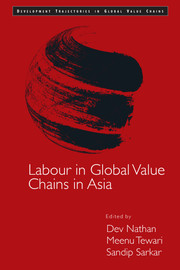Book contents
- Frontmatter
- Contents
- Figures
- Tables
- Foreword
- Preface
- Acknowledgements
- Introduction
- Captive Governance
- Modular Governance
- Relational Governance
- 18 Still a Distance to Go: Social Upgrading in the Indian ITO-BPO-KPO Sector
- 19 What Do Workers Gain from Being in a GVC? ICT in India
- Conclusions
- Notes on Contributors
- Index
18 - Still a Distance to Go: Social Upgrading in the Indian ITO-BPO-KPO Sector
from Relational Governance
Published online by Cambridge University Press: 23 July 2017
- Frontmatter
- Contents
- Figures
- Tables
- Foreword
- Preface
- Acknowledgements
- Introduction
- Captive Governance
- Modular Governance
- Relational Governance
- 18 Still a Distance to Go: Social Upgrading in the Indian ITO-BPO-KPO Sector
- 19 What Do Workers Gain from Being in a GVC? ICT in India
- Conclusions
- Notes on Contributors
- Index
Summary
Introduction
India is the worldwide offshore services market leader, with a share of 58 per cent of the global outsourcing industry. The aggregate revenues in FY 2013 were about $108 billion with exports contributing 75.8 billion of the total industry revenues. As a proportion of national GDP, the sector has grown from 1.2 to 8 per cent and with regard to the share in the total exports from 4 to 25 per cent between 1998 to 2013, providing direct employment to 3 million and indirect employment to 9.5 million (NASSCOM, 2013).
On this road to becoming a market leader, some argue that Indian IT firms, over the past decades, have upgraded to offer all services in the value chain, including information technology outsourcing (ITO), business process outsourcing (BPO), knowledge process outsourcing (KPO), and a significant number of advanced services for specific industries such as finance and health care that were once strictly considered to be the preserve of the industrialized world (Fernandez-Stark et al., 2011). In doing so, they have made a steady movement along the knowledge continuum in the direction of increasing expertise and information-intensiveness in the nature of the work that is outsourced (Thatchenkery et al., 2004).
This emergence of ‘high-end’ or ‘up the value chain’ services, besides being a key driver in changing the face of India's outsourcing industry (Raman et al., 2007) has widened the labour market in terms of the skills and the educational backgrounds of those employed in the sector. For instance, engineers, MBAs, PhDs, CFAs, lawyers, etc., are groups now sought after for employment in KPO organizations. Further, the Indian ITO-BPO-KPO sector is considered to be a prime example of global production networks providing high-quality employment opportunities replete with the privileges of high salaries, career development opportunities, comfortable working conditions and a range of employee friendly HR policies (Fernandez-Stark et al., 2011). In short, some argue that ‘decent work’ does not appear to be a relevant issue for this industry (Upadhya, 2010).
- Type
- Chapter
- Information
- Labour in Global Value Chains in Asia , pp. 423 - 449Publisher: Cambridge University PressPrint publication year: 2016
- 3
- Cited by



